NHS Retirement Fellowship stories
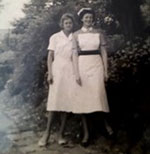 Bernice, Dora and Doris Harris – Retired Nurses and Pharmacy Technician
Bernice, Dora and Doris Harris – Retired Nurses and Pharmacy Technician
In 1947 Dora, my mum, started her nursing career at St. Giles Hospital in Camberwell, South London. Here she met Bernard who worked there as an electrician, and they married in 1953. She later moved to Norwood Cottage Hospital, South London and my Aunty Doris also worked there as an assistant in the Outpatients’ department.
I joined the NHS in 1972 and trained and studied for my Apothecary Hall and City of Guilds qualifications to become a hospital Pharmacy Technician at Bolingbroke Hospital, Wandsworth and continued working for the NHS pharmacy for forty years.
I am very proud to have carried on the family tradition of working for the NHS.
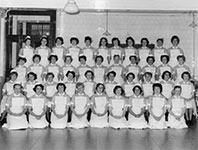 Molly Gibson, Retired Nurse
Molly Gibson, Retired Nurse
I trained at the University College in London between 1960 and 1963, starting when I was 18.
I left school when I was 16 and there were two avenues for pre-nursing then, either to be a cadet nurse or to do an orthopaedic nursing certificate, which I chose to do in Sheffield.
I’d only come to England from Africa the year before and I made such good friends – the camaraderie was lovely. Some of those girls are lifelong friends.
Our training allowance was £285 per year which left you with about £2 and seven shillings a week for yourself. They looked after us well though. They encouraged mental and physical recreation for student nurses, so we did a lot of swimming and tennis and had inter-hospital competitions.
I then trained as a midwife, but my father died, and my mother wasn’t coping so I moved back home. Then I got married and we lived in Wiltshire when the children were small, and I worked evenings in the family planning clinic until 1985 when my husband was relocated to Blackpool. I did a health visiting course as my mother had been a local health visitor and I worked as a Community Practice Teacher in Blackpool until I retired in 2005.
It has been a very satisfactory career and I have enjoyed it.
See below for more NHS Retirement Fellowship stories
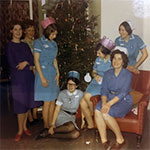 I started training at the Radcliffe Hospital in Oxford in 1967 when I was 18. There was 69 of us in our year, a really big cohort. Only one of us was married and lived locally, the rest all moved to Oxford to do our training.
I started training at the Radcliffe Hospital in Oxford in 1967 when I was 18. There was 69 of us in our year, a really big cohort. Only one of us was married and lived locally, the rest all moved to Oxford to do our training.
Our nurses’ home was some way out from the hospital, so every morning at 7.30am a double decker bus would take us to the hospital for our shift starting at 8am. It was hard work but there was lots of fun. The shift pattern was two weeks of days, seven nights on duty, then five nights off, which was good for those of us who had moved away from home as it was an opportunity to travel home.
I remember being on the surgical wards and all reusable instruments were sterilised on the ward using water/steam in large metal chambers or autoclaves. There was no central sterilisation unit during those early years. There was no technology with IVI/ drips either, you had to manually calculate the number of drops over the time period and stand to ensure it was working correctly and keep checking it throughout your shift. Now they just press a button, and it does it all for them.
I felt very nervous when I did my turn on the paediatric ward. I didn’t have any children in my family, and I was really worried about looking after babies and children and helping them professionally. I also remember on nights we had to be as quiet as possible to encourage the patients to sleep as much as they could.
I worked in nursing homes when my children were very small and then came back into acute hospital care when they were of school age. I did 11 years of night duty, which fitted in well with child care. When I decided to go back to day shifts, I took some bank work alongside my nights to re-establish a name for myself and decide where I wanted to work within the acute sector, which turned out to be surgical and medical outpatients units. With promotion to Sister, I transferred to working in a local community hospital in Tewkesbury until I retired in 2009 when I was 60.
I can’t think of anything else I would have wanted to do other than nursing. I have got a caring streak that needs to be fulfilled.
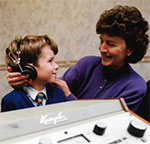 I left school when I was 15 and went to Secretarial College for two years. Following this I worked in an office environment for 6 years. Later, I was asked to take a job at my daughter’s school as a secretary on a temporary basis which led onto another school temporarily, which had a unit attached for children with deafness and hearing difficulties.
I left school when I was 15 and went to Secretarial College for two years. Following this I worked in an office environment for 6 years. Later, I was asked to take a job at my daughter’s school as a secretary on a temporary basis which led onto another school temporarily, which had a unit attached for children with deafness and hearing difficulties.
I learned of a position which was coming up as an Audiometrician and due to my experience working with children I applied for it. You didn’t have to be medically trained as training to use an Audiometer would be given. There were 20 applicants applying for two jobs and I was successful. It was in 1981 when I was 36 and it was a position which would fit in with my family life.
I moved from the educational sector to the NHS. I thought it was going to be a short-term job, but I loved it and was there for 24 years until I retired. I went out into schools testing children’s hearing, retesting in clinics. I loved meeting different and interesting people but the thing I missed most when I retired was that contact with children, teachers and my colleagues. I think I will have tested thousands of children throughout the Blackpool and Fylde area in my time doing the job.
The NHS has been very good to me. I have had a job which I loved.
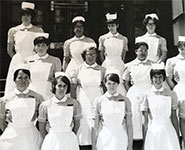 I was in the lower sixth doing my A levels when someone at the nurses’ recruitment centre told me you didn’t need them to be a nurse and to get some experience with people and apply. So, that is what I did.
I was in the lower sixth doing my A levels when someone at the nurses’ recruitment centre told me you didn’t need them to be a nurse and to get some experience with people and apply. So, that is what I did.
I applied to three hospitals and my mum came with me to the interviews. I was offered a place at all three and I chose the Royal Free. There wasn’t really anything else I ever wanted to do.
The first renal transplant unit was at the Royal Free and the unit was below the nurses’ home, the first part of the new hospital to be built. The liver transplant patients were in a side room on a ward receiving special one-to-one nursing care. There were no ITU’s in those days. The donors would come in by ambulance with a police escort.
Before the renal unit opened, we had patients having peritoneal dialysis on normal medical wards. We had to keep track of the timing of the clamping and unclamping of the tubes doing the dialysis using our watches, whilst also doing our other work on a busy ward. We didn’t have any machines to do it for us like they have now.
I then left for 11 years to have my family and when I went back in 1982 I retrained as a health visitor, and I did that for the rest of my career.
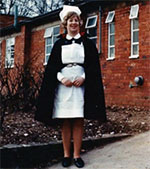 I started as a student nurse in 1963 at the Royal Hospital and Queen Alexandra Hospital in Portsmouth. I qualified as an SRN (state registered nurse) in 1966.
I started as a student nurse in 1963 at the Royal Hospital and Queen Alexandra Hospital in Portsmouth. I qualified as an SRN (state registered nurse) in 1966.
I became a ward sister at the age of 24 – I was the youngest sister they had ever had. I was in charge of a high dependency gynaecology ward of 24 beds – the surgeons and doctors were based at another hospital, so they came to do the operations and their ward rounds and then left us to it. It was a lot of responsibility.
I’m pregnant in the picture taken in 1970, and didn‘t return to nursing for 12 years. In 1982 I became a family planning nurse working in local clinics, and after 22 years I had to retire due to ill health.
I remember my mother showing me the bill she had to pay when she had me before the NHS. By the time I was nursing, the NHS was well established. It’s changed a lot since I left, patients used to be in hospital for 14 days after a major procedure like a hysterectomy – now they are home in a few days.
I thoroughly enjoyed my time in the NHS. I only ever wanted to be a nurse. I have a photo of me dressed as a nurse at the age of five.
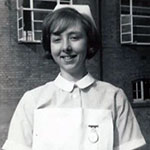 The photo was of me when I just started training school at Fulham Hospital in 1962. I was 18. Nobody questioned the NHS by that stage, it was part of the structure of society.
The photo was of me when I just started training school at Fulham Hospital in 1962. I was 18. Nobody questioned the NHS by that stage, it was part of the structure of society.
We did 12 weeks in school – in full nurses’ uniform – and every Friday we went down to the wards. You spent your first 12 weeks there too. We had a schedule which recorded what you had to be able to do throughout your training. The sister had to sign to say you had either seen it, you’d done it or you were competent at it. You couldn’t qualify without being signed off as competent at everything. After your training, you progressed very quickly but it was very structured. I was very young when I got my first sister’s role.
I was a night sister for seven years before I went back to a day sister’s role. When I retired in 2002, I was a senior bed manager and that was a very different job!
The biggest changes I noticed were the rapidity in diagnosis and treatment. When I started, a heart attack patient would spend one week in bed, one week in a chair and one week getting mobile again before they were allowed home. Now they are out of hospital in a few days.
There are many different types of jobs in the NHS now. Nurses continue to work extremely hard, and I am very proud to have worked for the NHS.
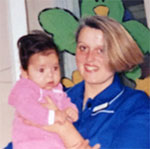 I started training in 1974 at Bath Orthopaedic Hospital. It was 20 months in Bath, and it was very good training. The sister was very strict about time keeping and how you made the beds. You worked for eight nights on and six nights off.
I started training in 1974 at Bath Orthopaedic Hospital. It was 20 months in Bath, and it was very good training. The sister was very strict about time keeping and how you made the beds. You worked for eight nights on and six nights off.
A lot of the patients were on the wards for the long term, so you got to know them very well. Visiting was very restricted on the children’s wards. I was a nurse for four decades and parents living on the wards was something that only started in my later years, although one parent was allowed to stay on a camp bed from the 1980s. It went from being very task orientated to very family centred and that was good.
I worked in the NHS for 46 years and there were many changes. It changed from looking after lots of people to looking after smaller groups of people, in more depth. I loved nursing all my career.
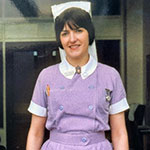 I trained at the Queen Elizabeth School of Nursing in Birmingham, between 1964 and 1968.
I trained at the Queen Elizabeth School of Nursing in Birmingham, between 1964 and 1968.
During the first two years of training, it was compulsory to live in the nurses’ home and it was in this environment that great friendships were formed. We were a large group and many of us are still in contact today.
Following Registration, I worked as a Staff Nurse and Senior Staff Nurse on a General Surgery/Colo-Rectal ward at the Queen Elizabeth hospital. I loved the uniforms that we wore – they fitted well and looked smart, which made us feel very special and proud. The different style caps denoted seniority within the profession. The most notable change was when the short cap changed to a long cap. There was always great excitement on the finals results day when we all looked around the dining room for all the new “long caps”.
In 1970 I moved to North Wales for a short period. I had a short break and then secured a Staff Nurse position at Chester Royal Infirmary. I worked on General Surgical and Mixed Speciality Private patients wards, progressing to Ward Sister level.
In 1974 I moved to Gloucestershire and subsequently joined the Surgical unit as a Junior Sister at Cheltenham General Hospital. This was the start of an enjoyable thirty-nine years at Cheltenham General.
Retirement from the wards gave me an opportunity to work, once again, as a Staff Nurse. I started to work part time in the Oncology/Chemotherapy Outpatients unit and practiced the “hands-on nursing” that I had always enjoyed the most.
I enjoyed working for the NHS. It was a privilege to do so, and I never wanted to do anything else. My colleagues in the ward team enjoyed working together to provide the best possible care for patients. We were like a family to me and some of us are friends today.
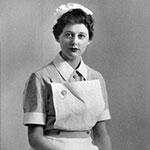 My grandparents were both nurses – my grandfather was the head of the mental health hospital. I announced at the age of three I was going to be a nurse.
My grandparents were both nurses – my grandfather was the head of the mental health hospital. I announced at the age of three I was going to be a nurse.
I was 17 when I started as a cadet nurse. I began my training at City Hospital in Nottingham in 1954. It was an apprenticeship style of training and we all lived in. You did a few weeks on the ward and then went to the classroom to learn some more and then back on the ward. Later on, I trained to be a health visitor.
I was 25 when I got married and I finished my training and went on to do midwifery training. I went part time after I had the children until 1976 when I became a health visitor. I was also an infant feeding specialist, supporting premature babies.
I enjoyed my nursing very much.
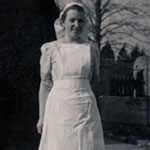 In 1947 I left school at the age of 16 years. Initially I wanted to be a Nursery Nurse but this would have meant leaving home to train so I opted to be a Cadet Nurse at St Martins Hospital in Bath. I started in September 1947 and worked on the Children’s ward.
In 1947 I left school at the age of 16 years. Initially I wanted to be a Nursery Nurse but this would have meant leaving home to train so I opted to be a Cadet Nurse at St Martins Hospital in Bath. I started in September 1947 and worked on the Children’s ward.
The Children’s ward was a nightingale single story unit with about 10 cots, 10 beds and a small annex for isolating any infectious patient. We worked a 48 hour week, day duty was 8am-8pm and had one and a half days off a week.
Our duties were very varied. First thing in the morning we had to clean the ward floor. We pushed the beds and cots to the centre of the ward, put tea leaves down on the floor to reduce dust and then swept the floor. We also had to stoke the solid fuel burners in the centre of the ward – there was no central heating in the wards in those days!
We then cared for the children which included taking the children to theatre for surgery, staying in theatre during the operation and then bringing the unconscious child back to the ward with the help of a porter to guide the trolley.
In December 1949 I went to the Royal United Hospital in Bath. This was a 3-year training with a compulsory 4th year as a Staff Nurse. As my main interest was Paediatrics, I did this on the Paediatric unit. I knew I wanted to do training in children’s nursing and that was a two-year post registration course, so I did that at the Queen Elizabeth Hospital in London and then I came back to the Royal United Hospital in Bath as the first night staff nurse in the casualty unit.
I am very proud of the NHS because it has done a lot of good for a lot of people and there have been great advances that have been made over the years in all aspects of treatment. When I think of other countries where people have to pay for their treatments it makes me realise how wonderful the NHS is.
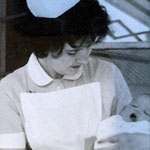 I joined the NHS in a roundabout way. I started out as a nursery nurse in Tunbridge Wells in 1962 and then I went to work in a maternity unit and I fell in love with midwifery.
I joined the NHS in a roundabout way. I started out as a nursery nurse in Tunbridge Wells in 1962 and then I went to work in a maternity unit and I fell in love with midwifery.
I did my midwifery training in 1964 at the Canadian Red Cross Hospital in Taplow. It was the best hospital in the country, and it was on Lord Astor’s estate. He had invited the Canadians to build a military hospital on his estate in the First World Water which was partially rebuilt and enlarged in the Second World War. It was given to the NHS at its inception in 1948.
I was there for 10 years but I realised that there were some gaps in my knowledge so went to do my general nurse training. Within six months I had returned to being a midwife at Yeovil District Hospital and I stayed there until I retired in 2002. By then I was a sister in charge of the labour ward and the special care nursery. I have no idea how many babies I have delivered but I suspect it must be thousands!
I am very proud to have worked for the NHS.
